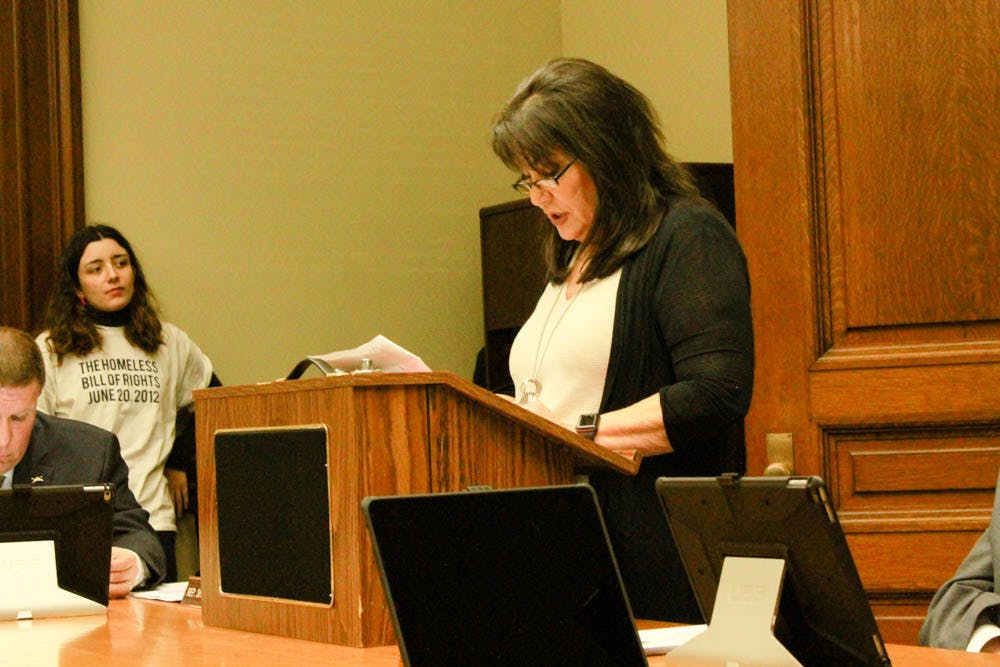There were more speakers than listeners at a Rhode Island House Judiciary Committee hearing Wednesday evening that included debate over a bill that could prevent panhandling in the state.
Representative Charlene Lima, D-Dist. 14, is sponsoring bill H5330 which, if passed, would make it illegal for a driver in an active lane of travel to hand any object to someone standing outside the vehicle. The bill’s opposition — primarily the American Civil Liberties Union of Rhode Island and members of homeless advocacy groups — argue that the so-called “panhandling bill” is an attack against those who are most in need, some of whom are homeless. The law would not prevent individuals from pulling off the road to offer money to panhandlers.
The Judiciary Committee recommended the bill be held for further study.
Lima testified that the bill would address issues of road safety in light of accidents involving panhandlers. In December 2018, a woman panhandling was hospitalized after she was struck by a car, according to WPRI. The bill cites national traffic crash statistics, including the 4,735 pedestrian fatalities and an estimated 66,000 pedestrian injuries that took place in 2013. The bill also included pedestrian fatalities from the first six months of 2015 and the number of median crossover crashes that resulted in fatalities in 2006.
Lynn Ladinger, a lawyer for the R.I. ACLU, refered to the bill’s citation of traffic-related accidents as “complete(ly) bogus” because “there is no correlation between those numbers and either panhandling or the specific targeted conduct.”
Barbara Freitas, director of the Rhode Island Homeless Advocacy Project, agreed. “Don’t let the large numbers from the national statistics fool you. Framing the argument around road safety makes the bill more unique,” but “it’s pretty transparent in what it’s trying to accomplish.”
In addition to their criticism of statistics, opponents argued that the law is unconstitutional.
The bill impedes “an act of communication” between the person inside the vehicle and the person standing outside, Ladinger told The Herald. “Panhandling is clearly a form of protected speech; it’s been recognized as such by case after case.”
Community Outreach Director at House of Hope Megan Smith ’10 emphasized the importance of the communication between panhandlers and the person who pulls over to donate to them. “People don’t just throw change. What happens is conversation,” she said.
Lima defended the constitutionality of the bill. “It is my constitutional right to regulate the rules of the road,” she said.
During her testimony, Lima said that her intentions are being misinterpreted. She insists it is “totally not true” that she’s attacking panhandlers. “The bill does not prevent someone from donating,” Lima told The Herald.
“It’s demeaning to throw change to somebody on the road,” she said, explaining during the hearing that the law encourages people to “donate to associations that are actually legit.” The bill, she said, can in fact be used to help those in need. “I would like to see a portion of the fines go to help the homeless. This is not about panhandling. It’s about safety on the roads,” Lima said.
Opponents believe that the bill’s exceptions clause proves it does target panhandlers because it would allow certain groups to circumvent the law.
This clause grants cities or towns the right to distribute “special solicitation permits” to any individuals or groups who meet standards specified by the municipality. Any party that carries these permits would be allowed to receive donations from drivers in active lanes of travel.
“There’s an intention here about who this bill is meant to affect. People who are experiencing homelessness don’t have much power within the legislative structure” to get one of these permits, Smith said. The exceptions clause “carves out the opportunity for charities to do what sponsors claim is too dangerous. (It) creates favoritism for one type of speech over another,” Ladinger said.
In 2017, Lima proposed a similar bill, which she characterized as “basically the same,” but it did not pass. She said it was blocked because of “little political shenanigans.” She would not elaborate.
The R.I. ACLU and RIHAP, among other groups and individuals, testified against the bill, while Lima was the only person to speak for it.





